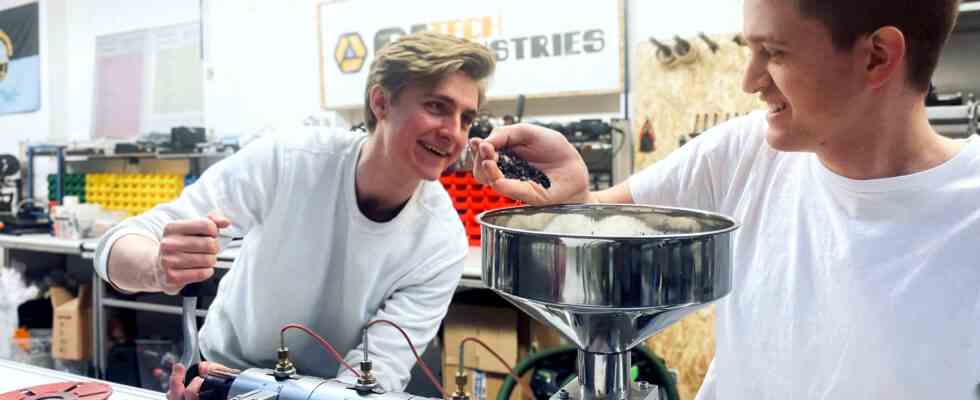Status: 01/18/2023 12:14 p.m
Today the Bundestag is debating the start-up strategy of the traffic light coalition. The Federal Ministry of Economics has presented a ten-point plan. Will he help the young company founders?
In a hall in Nieder-Olm in Rhineland-Palatinate, several employees assemble wooden panels. It’s easy to see that this is going to be a caravan – on a small scale. “Camping buses are only available from 50,000 euros upwards. We want to offer an inexpensive and sustainable alternative for outdoor fans,” says Hannes Trautmann. The basic variant at his company “Miniaturing” costs just under 14,000 euros: This includes a kitchen with a cool box, storage space and a bedroom with a length of a good two meters. The minimalist camper is relatively light at around 500 kilograms and can be towed by a normal car. Trautmann founded his company five years ago. But the road to get there was rocky.
Business idea on the beach
“My school days were not a success story,” says the 26-year-old. “I went from high school to secondary school and just barely got my degree there. I also found it difficult to get along at vocational school. The teacher describes a problem and offers a solution. That wasn’t my thing at all,” remembers Trautmann. Everything was too theoretical for him. He wanted to learn and work practically – like now as an entrepreneur.
After graduating from school, Trautmann went to France and Slovenia as a surfing instructor – and there he had the crucial idea: “Young outdoor fans in particular can’t afford a camping car. But surfers and kayakers like to sleep outside – right on the beach. That was my niche.”
Back in Germany, Trautmann built the first prototype of today’s mini caravan in his parents’ garage. “Both of them looked pretty weird at the time. They wanted me to follow the classic path of education.” But Trautmann stuck with it and continued to refine the model.
No entrepreneurship in schools
The young company founder received a subsidy of 5,000 euros from the employment office. The first employees came. “But the breakthrough came with an appearance on the TV show ‘Die Höhle der Löwen’. Although there was no deal there, investors queued up afterwards and we were able to invest properly,” says Trautmann. Otherwise the business idea would hardly have made it onto the market.
13 employees now work at Trautmann. They make up to 140 mini campers a year. “I don’t look at CVs and references, but at personal commitment. In addition to a carpenter and an architect, we also have an ethnologist who is responsible for purchasing materials. We have really wild combinations. Our best fitter is a trained hairdresser.”
Trautmann made the virtue of his entrepreneurship out of the misery of his school days. “Our education system does not provide for entrepreneurship. Self-employment is not sufficiently encouraged. But as an entrepreneur you have to constantly look for your own new solutions. A lot of potential is wasted here in Germany.”
“Our best fitter is a trained hairdresser”: Hannes Trautmann, here in front of one of his mini campers, does not look at CVs and certificates.
Image: Hannes Trautmann
Plastic waste becomes filament
It is around twenty kilometers from Nieder-Olm to Oppenheim. Here, too, the company history of a start-up begins in a garage. “With my friends, I thought about recycling old cell phone cases and thus avoiding plastic waste. That was suddenly our business idea. I was 15 years old,” says Milan von dem Bussche.
Today his company “QiTech” sells so-called filament, which is made from plastic waste. Filament is a type of ink that 3D printers need. In addition, “QiTech” produces machines in which the plastic is melted and then the filament is manufactured. “Our goal is for our products to be available all over the world, which then produce new filament, thus avoiding plastic waste and making new, high-quality goods out of it,” says the 19-year-old.
Start with a kitchen mixer
Here, too, the beginning was rather unconventional. “For the first series of tests, we used my mother’s kitchen blender to chop the plastic. I removed the motor for our first filament machine from a height-adjustable bed. When my mother returned from her business trip, it caused real trouble,” tells about the bush laughing.
For this year, “QiTech” already has orders worth around 200,000 euros. Customers include automotive groups and universities that use the machines to advance research projects. Von dem Bussche and his team now work in a hall near the Technical University of Darmstadt. “Our team is studying mechanical engineering or computer science here. This means we can also attract new employees. In this respect, Germany is a very good location,” says the young entrepreneur.
Bureaucracy slows down company founders
However, it was completely different when the company “QiTech” was founded, reports von dem Bussche. At first he was not allowed to open a bank account because he was 15 years old and therefore not legally competent. The family court in Mainz repeatedly refused the corresponding approval – due to formal errors and finally on the grounds that “nothing like this has ever been done in Mainz,” says von dem Bussche, shaking his head.
Calls were only possible there until twelve o’clock. “During the long breaks we stood in the schoolyard and tried to bring our concerns forward by phone – unfortunately without success,” he recalls. “In England, for example, you can set up a company in three days. Everything goes online. In Germany, on the other hand, you have to wait weeks for an appointment with a notary. Then it takes forever to be in the commercial register.”
And how did it work out in the end? “We then formally appointed my older sister as managing director until I was 18 years old. But she was studying in the Netherlands during this period and wasn’t even here. Who knows what would have happened to our idea if the three of us years?”

